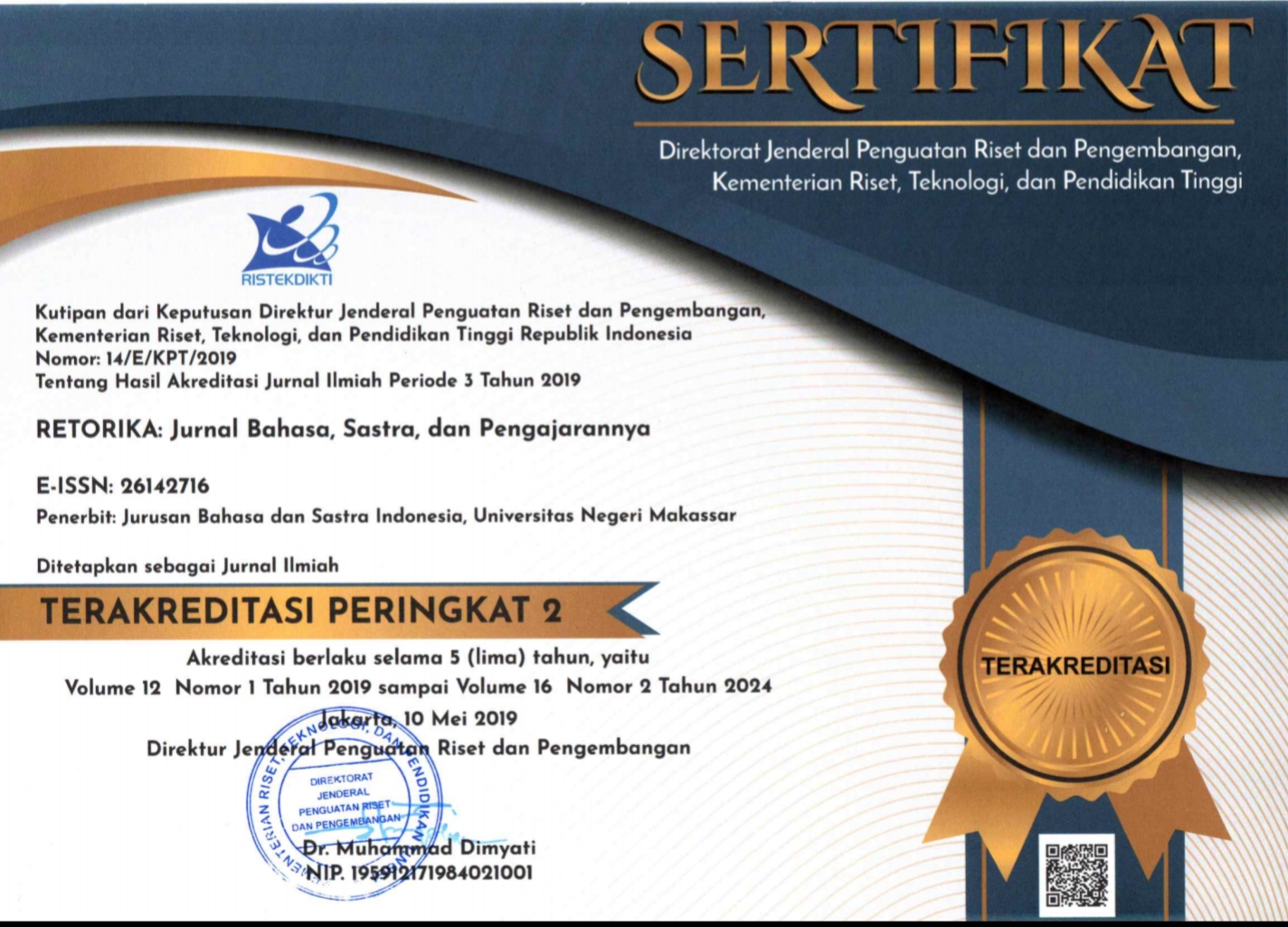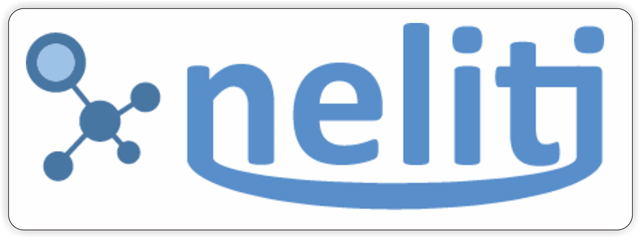REPRESENTASI KEKUASAAN DALAM WACANA KELAS DI SEKOLAH MENENGAH PERTAMA
(1) Universitas Tadulako, Palu
(*) Corresponding Author
DOI: https://doi.org/10.26858/retorika.v12i1.7384
Abstract
Keywords
Full Text:
PDFReferences
Andreyanto, J. 2014. Representasi Kekuasaan pada Tindak Tutur Guru dalam Pembelajaran Baha-sa Indonesia Kelas VIII A SMP Negeri 10 Kota Bumi Tahun Pelajaran 2013/2014. Tesis. Lampung: Pascasarjana Universitas Lampung.
Biria, R., & Mohammadi, A. 2012. The Sociopragmatic Functions of Inaugural Speech: A Critical Discourse Analysis Approach. Journal of Pragmatics, 44(10), 1290–1302, doi: 10.1016/ j.pragma.2012.05.013.
Djamarah & Syaeful Bahri. 2005. Guru dan Anak Didik dalam Interaksi Anak Didik. Jakarta: Rineka Cipta.
Eriyanto. 2001. Analisis Wacana: Pengantar Analisis Teks Media. Yogyakarta: LkiS.
Fairclough, N. 2013. Critical Discourse Analysis: The Critical Study of Language (Second Edition). London: Routledge.
Freire, P. Tanpa Tahun. Politik Pendidikan: Kebudayaan, Kekuasaan, dan Pembebasan. Diterjemahkan oleh Agung Prihantoro dan Fuad Arif Fudiyartanto. 2007. Yogyakarta: Pustaka Pelajar.
Jufri. 2008. Analisis Wacana Kritis. Makassar: Badan Penerbit Universitas Negeri Makassar.
Pace, W. R. & Don F. Faules. 2006. Komunikasi Organisasi. Bandung: PT. Remaja Rosda Karya.
Robbins, S. P. & Judge, Timothy A. 2013. Perilaku Organisasi. Jakarta: Salemba Empat.
Stamou, A. G. 2018. Synthesizing Critical Discourse Analysis with Language Ideologies: The Example of Fictional Discourse. Discourse, Context & Media, 23: 80–89, doi:10.1016/ j.dcm.2017. 04.005
Shim, S. H. (2008). A Philosophical Investigation of The Role of Teachers: A Synthesis of Plato, Confucius, Buber, and Freire. Teaching and Teacher Education, 24 (3), 515–535. https://doi.org/10.1016/j.tate.2007.09.014
Suharyo. 2009. Kekuasaan Sosial dalam Bahasa (Studi Kasus pada Komunikasi Verbal dalam KBM di SMP 32 Semarang). Laporan Hasil Penelitian. Semarang: Fakultas Ilmu Budaya, Universitas Diponegoro.
Tarmini, W. 2016. Representasi Kekuasaan pada Tindak Tutur Dosen di Lingkungan FKIP Universitas Lampung: Sebuah Kajian Pragmatik. Prosiding Konferensi Internasional IKADBUDI VI, Bandar Lampung.
Taylor, L. A., Vlach, S. K., & Mosley Wetzel, M. (2018). Observing, Resisting, and Problem-Posing Language and Power: Possibilities for Small Stories in Inservice Teacher Education. Linguistics and Education, 46, 23–32. https://doi.org/10.1016/j.linged.2018.05.006
van Dijk, T. A. (2006). Politics, Ideology, and Discourse. Dalam Encyclopedia of Language & Linguistics (hlm. 728–740). Elsevier. https://doi.org/10.1016/B0-08-044854-2/00722-7
Zamroni. 2001. Pendidikan untuk Demokrasi. Tantangan Menuju Civil Society. Yogyakarta: Bigraf Publishing.
Article Metrics
Abstract view : 927 times | PDF view : 169 timesRefbacks
- There are currently no refbacks.
Copyright (c) 2019 Asrianti Asrianti

This work is licensed under a Creative Commons Attribution-NonCommercial 4.0 International License.
Published by:
Department of Indonesian Language, Faculty of Languages and Literature, Universitas Negeri Makassar in cooperate with Asosiasi Dosen Bahasa dan Sastra Indonesia (ADOBSI) and Ikatan Program Studi Pendidikan Bahasa dan Sastra Indonesia (IKAPROBSI).
Address: Department of Indonesian Language Office, DG Building Second Floor, UNM Parangtambung, Daeng Tata Raya Street, Makassar, South Sulawesi, Indonesia
 Email: retorika@unm.ac.id
Email: retorika@unm.ac.id

RETORIKA: Jurnal Bahasa, Sastra,dan Pengajarannya is licensed under a Creative Commons Attribution-NonCommercial 4.0 International License.
















